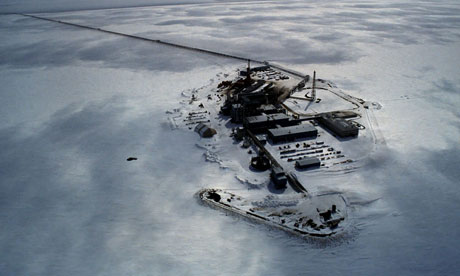BP facing multimillion-dollar legal claim from British pension fund
As it struggles with a major leak in the Gulf of Mexico, the oil company is accused of deliberate recklessness over a spill on Alaska

BP's Prudoe Bay oil field in Alaska, which suffered corrosion problems. Photograph: Getty Images
The Gulf of Mexico oil spill, which could see BP face hundreds of lawsuits, is giving new impetus to a highly damaging legal case stemming from a previous environmental disaster in Alaska.
A UK pension fund alleges that it lost money because of falls in the BP share price after a pipeline leak in the Prudhoe Bay field four years ago. Lawyers for the fund say the latest spill is providing further ammunition for its case.
"It is too soon to tell exactly what went wrong in the gulf, but what is clear is that they [the accidents] both reflect a corporate culture and series of operating procedures that need to be reformed," said Thomas Dubbs, a partner at New York law firm Labaton Sucharow, which is handling the case against BP for the Lothian pension fund, claiming tens of millions of dollars. The fund, an investor in BP, looks after the retirement benefits of 67,000 workers employed by councils in Edinburgh and the Midlothian area, and also by the local bus company.
The pension providers are taking the company to court for the stock market losses attached to pipeline fractures that resulted in 200,000 gallons of oil being spilled and the Prudhoe Bay field being temporarily shut down. Accidents in March and August 2006 knocked billions off the BP share price, and Lothian is arguing that its funds have paid the price for management ineptitude.
The Lothian case could open the way for similar challenges and do further damage to BP's reputation, which was also hurt by the Texas City refinery fire in the US in 2005, when 15 workers died. The company is being battered anew by the Gulf of Mexico disaster, which has wiped $30bn off the share price.
Investigations by Congress and US federal authorities into the Alaskan spills showed, say the plaintiffs, "that BP knowingly, or with deliberate recklessness, failed to properly maintain, operate, inspect and monitor its pipelines at Prudhoe Bay".
They go on: "BP had received repeated warnings from multiple sources and knew that its pipelines were severely corroded, repeatedly cut corrosion-inhibiting maintenance in order to reduce costs and improve profits, and failed for more than 14 years to inspect the inside of the pipelines with an in-line inspection tool that would have precisely identified the level and location of the corrosion."
The Prudhoe Bay case comes as the oil company and the rig operator in the Gulf of Mexico, Transocean, are reported to be facing 130 lawsuits filed by fishermen, property owners and tourism businesses claiming damages from the oil coming ashore after the explosion.
The Lothian action, brought against BP's former group chief executive Lord Browne and BP America boss Robert Malone, claims that the company knew of the corrosion problems at the highest level. The Lothian lawyers say that, as far back as May 2004, the chairman of the environmental committee of BP's board of directors, Walter Massey, received a letter predicting a "major catastrophic event" and warning that cost-cutting had caused "serious corrosion of flow lines and systems".

No comments:
Post a Comment